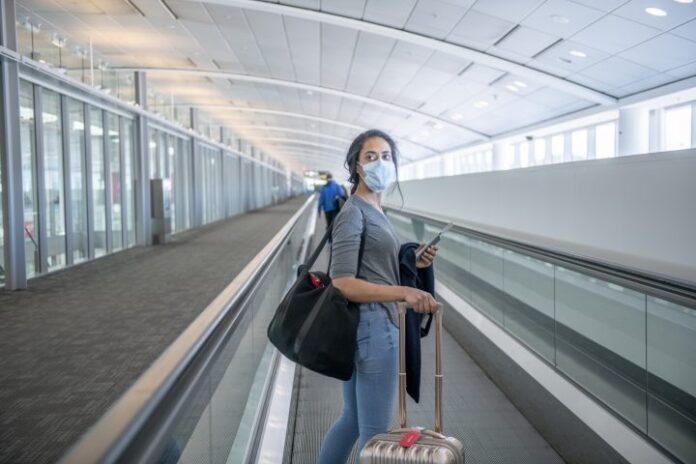Canadian travellers may be worried about contracting monkeypox after a public health warning was issued earlier this week urging caution for those planning to go abroad.
While there are ongoing concerns about the number of cases cropping up in countries that don’t normally see this virus, experts say the risk of outbreaks that could cause pandemic-level spread of the illness remains low.
And when it comes to travel, the risks of contracting monkeypox is also not something of major concern, says Dave Evans, an expert on virology and poxviruses at the University of Alberta.
“Realistically, I know the numbers sound large, but in the great scheme of things, it’s almost non-existent as far as risks go for infectious diseases,” Evans said.
“If you’re travelling to other parts of the world and you’re meeting strangers, whatever you’re up to, there are some things common sense says that you should be aware of. But I really would not worry about monkeypox.”
On Tuesday, the Public Health Agency of Canada (PHAC) issued a level two travel health notice to encourage people travelling outside the country to take extra precautions amid the ongoing monkeypox outbreak in countries around the world.
However, this advisory carefully noted those at most risk of infection are people who have had direct contact with individuals who currently have monkeypox or their household or intimate contacts.
If a traveller becomes ill, they could find themselves subjected to isolation or other measures to limit the spread of the virus, the advisory said. They could also face delays returning home if they’ve left the country.
That means, if you haven’t been exposed to someone who’s sick or someone very close to an infected person and are not planning to attend any large parties or mass gatherings as part of your travel, the chances of catching this illness is negligible, Evans said.
“The virus is spread by close contact of any kind. And of course, that includes sexual contact. But if you can be avoiding any of that with at-risk parties, you’re good to go.”
Angela Rasmussen, a virologist at the Vaccine and Infectious Disease Organization at the University of Saskatchewan, says in her own preparations for upcoming travel to Europe she is more concerned about keeping herself safe from exposure to COVID-19.
“However, many of the same precautions I take for that are relevant to monkeypox (such as) wearing a mask in crowded spaces, limiting exposures to people outside my household, practicing good hand hygiene and disinfecting surfaces like airplane seatback trays.”
But travellers who may plan to — or happen to — meet new intimate partners in their travels should be more vigilant, Rasmussen said.
WHO doesn’t expect monkeypox to turn into another pandemic – May 30, 2022
“It does appear that monkeypox transmission is linked to sexual networks and intimate contact, so people who are travelling to events where they might engage in sex with new partners should be particularly careful and understand that wearing a condom won’t prevent monkeypox transmission since it can be transmitted by skin-to-skin direct contact as well as contact with body fluids.”
She suggests anyone who has had contact with a new partner in the last several weeks should be vigilant for unusual rashes or symptoms.
More than 1,000 monkeypox cases have been reported in countries outside west and central Africa, where the virus normally spreads, the World Health Organization (WHO) said Wednesday.
Related News
Halton Region records first case of rare monkeypox virus
Quebec now has 90 confirmed monkeypox cases
Nearly 30 countries where monkeypox is not endemic have reported outbreaks of the viral disease.
Canada has confirmed at least 98 cases of people infected with the virus, with 90 in Quebec, five in Ontario, two in Alberta and one in British Columbia.
On Tuesday, the U.S. Centers for Disease Control and Prevention (CDC) removed a mask recommendation from its monkeypox travel notice to avoid “confusion” over the disease.
The agency had earlier suggested that travelers wear masks as this can help protect against “many diseases, including monkeypox,” and said that monkeypox could be spread by “respiratory secretions during prolonged, face-to-face contact.”
Rosamund Lews, WHO’s lead expert on monkeypox, said Wednesday the primary drivers of the spread of this virus in non-endemic countries like Canada and the U.S. are face-to-face and skin-to-skin physical contact, which is why standard public health measures like contact tracing, surveillance and isolation for those who are ill is primarily being recommended.
“With respect to other modes of transmission, there’s a lot we still don’t know and more research needs to be done in this area, “ Lewis said during a press conference in Geneva.
Evans says he understands the heightened concerns about monkeypox among Canadians and travellers after two years of COVID-19 restrictions and 6.3 million coronavirus-related deaths worldwide.
Health officials urge calm as more monkeypox cases emerge in Canada – May 25, 2022
But small outbreaks of many diseases happen all the time around the world that the wider public just doesn’t normally notice, he said.
Given the historically low transmission of monkeypox and the heightened awareness of the current cases, Evans says he anticipates this viral outbreak and the public’s attention to it will soon “peter out quite quickly and disappear again.”
As for whether travellers should be especially concerned about monkeypox, the easy answer is no.
“I would worry about some other infectious diseases before I worried about monkeypox,” Evans said.
Related News
© 2022 Global News, a division of Corus Entertainment Inc.



